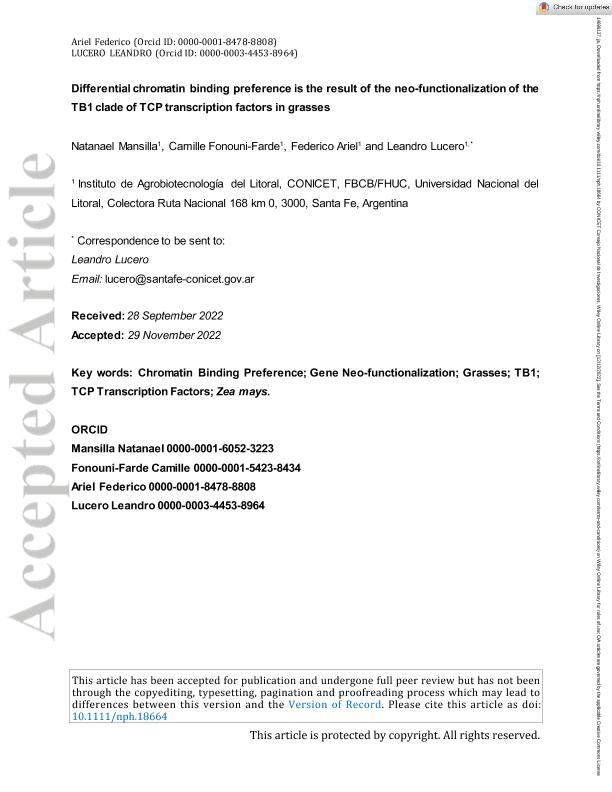Artículo
Differential chromatin binding preference is the result of the neo-functionalization of the TB1 clade of TCP transcription factors in grasses
Mansilla, Natanael ; Fonouni-farde, Camille Audrey
; Fonouni-farde, Camille Audrey ; Ariel, Federico Damian
; Ariel, Federico Damian ; Lucero, Leandro Exequiel
; Lucero, Leandro Exequiel
 ; Fonouni-farde, Camille Audrey
; Fonouni-farde, Camille Audrey ; Ariel, Federico Damian
; Ariel, Federico Damian ; Lucero, Leandro Exequiel
; Lucero, Leandro Exequiel
Fecha de publicación:
12/2022
Editorial:
Wiley Blackwell Publishing, Inc
Revista:
New Phytologist
ISSN:
0028-646X
Idioma:
Inglés
Tipo de recurso:
Artículo publicado
Clasificación temática:
Resumen
The understanding of neo-functionalization of plant transcription factors (TFs) after gene duplication has been extensively focused on changes in protein–protein interactions, the expression pattern of TFs, or the variation of cis-elements bound by TFs. Yet, the main molecular role of a TF, that is, its specific chromatin binding for the direct regulation of target gene expression, continues to be mostly overlooked. Here, we studied the TB1 clade of the TEOSINTE BRANCHED 1, CYCLOIDEA, PROLIFERATING CELL FACTORS (TCP) TF family within the grasses (Poaceae). We identified an Asp/Gly amino acid replacement within the TCP domain, originated within a paralog TIG1 clade exclusive for grasses. The heterologous expression of Zea mays TB1 and its two paralogs BAD1 and TIG1 in Arabidopsis mutant plants lacking the TB1 ortholog BRC1 revealed distinct functions in plant development. Notably, the Gly acquired in the TIG1 clade does not impair TF homodimerization and heterodimerization, while it modulates chromatin binding preferences. We found that in vivo TF recognition of target promoters depends on this Asp/Gly mutation and directly impacts downstream gene expression and subsequent plant development. These results provided new insights into how natural selection fine-tunes gene expression regulation after duplication of TFs to define plant architecture.
Archivos asociados
Licencia
Identificadores
Colecciones
Articulos(IAL)
Articulos de INSTITUTO DE AGROBIOTECNOLOGIA DEL LITORAL
Articulos de INSTITUTO DE AGROBIOTECNOLOGIA DEL LITORAL
Citación
Mansilla, Natanael; Fonouni-farde, Camille Audrey; Ariel, Federico Damian; Lucero, Leandro Exequiel; Differential chromatin binding preference is the result of the neo-functionalization of the TB1 clade of TCP transcription factors in grasses; Wiley Blackwell Publishing, Inc; New Phytologist; 237; 6; 12-2022; 2088-2103
Compartir
Altmétricas



